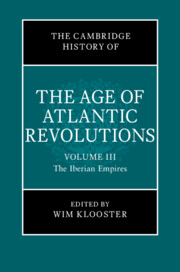Book contents
- The Cambridge History of the Age of Atlantic Revolutions
- The Cambridge History of the Age of Atlantic Revolutions
- The Cambridge History of the Age of Atlantic Revolutions
- Copyright page
- Contents
- Figures
- Maps
- Tables
- Contributors to Volume III
- Preface
- Introduction
- Part I The Spanish Empire
- 1 The Spanish Empire: General Overview
- 2 The Spanish Empire on the Eve of American Independence
- 3 The Cortes of Cádiz and the Spanish Liberal Revolution of 1810–1814: Atlantic and Spanish American Dimensions
- 4 The Constitutional Triennium in Spain, 1820–1823
- 5 Mexico: From Civil War to the War of Independence, 1808–1825
- 6 Central America
- 7 War and Revolution in the Southern Cone, 1808–1824
- 8 Caribbean South America: Free People of Color, Republican Experiments, Military Strategies, and the Caribbean Connection on the Path to Independence
- 9 The Southernmost Revolution: The Río de la Plata in the Early Nineteenth Century
- 10 Royalists, Monarchy, and Political Transformation in the Spanish Atlantic World during the Age of Revolutions
- 11 Africans and Their Descendants in the Spanish Empire in the Age of Revolutions
- 12 Concepts on the Move: Constitution, Citizenship, Federalism, and Liberalism across Spain and Spanish Atlantic
- 13 Patriarchy, Misogyny, and Politics in the Age of Revolutions
- 14 Impact of the French Caribbean Revolutions in Continental Iberian America, 1791–1833
- 15 Deferred but not Avoided: Great Britain and Latin American Independence
- Part II Brazil, Portugal, and Africa
- Index
11 - Africans and Their Descendants in the Spanish Empire in the Age of Revolutions
from Part I - The Spanish Empire
Published online by Cambridge University Press: 20 October 2023
- The Cambridge History of the Age of Atlantic Revolutions
- The Cambridge History of the Age of Atlantic Revolutions
- The Cambridge History of the Age of Atlantic Revolutions
- Copyright page
- Contents
- Figures
- Maps
- Tables
- Contributors to Volume III
- Preface
- Introduction
- Part I The Spanish Empire
- 1 The Spanish Empire: General Overview
- 2 The Spanish Empire on the Eve of American Independence
- 3 The Cortes of Cádiz and the Spanish Liberal Revolution of 1810–1814: Atlantic and Spanish American Dimensions
- 4 The Constitutional Triennium in Spain, 1820–1823
- 5 Mexico: From Civil War to the War of Independence, 1808–1825
- 6 Central America
- 7 War and Revolution in the Southern Cone, 1808–1824
- 8 Caribbean South America: Free People of Color, Republican Experiments, Military Strategies, and the Caribbean Connection on the Path to Independence
- 9 The Southernmost Revolution: The Río de la Plata in the Early Nineteenth Century
- 10 Royalists, Monarchy, and Political Transformation in the Spanish Atlantic World during the Age of Revolutions
- 11 Africans and Their Descendants in the Spanish Empire in the Age of Revolutions
- 12 Concepts on the Move: Constitution, Citizenship, Federalism, and Liberalism across Spain and Spanish Atlantic
- 13 Patriarchy, Misogyny, and Politics in the Age of Revolutions
- 14 Impact of the French Caribbean Revolutions in Continental Iberian America, 1791–1833
- 15 Deferred but not Avoided: Great Britain and Latin American Independence
- Part II Brazil, Portugal, and Africa
- Index
Summary
As they had in early modern Spain, Africans and their descendants across the Spanish Empire were able to achieve freedom through a variety of legal means. In the seventeenth century, as European competitors contested Spain’s claims on the Americas, free black military units became key to the defense of Spanish territories and the Spanish Crown recognized and rewarded their service. After a French monarch assumed the vacant throne of Spain in the eighteenth century, Bourbon administrators established Disciplined Militias offering additional protections and privileges to the African descended men who joined their ranks, and to their families. In return, this expanding free black class often expressed its loyalty to the Spanish Crown. The French and American Revolutions that rejected monarchy and disseminated new ideas such as the Rights of Man and constitutional forms of government forced Africans and their descendants to re-consider their options. Some rejected monarchy. Others, however, continued to trust in the monarchical system that had benefitted many generations of African descended families. Those chose royalism over rebellion. Africans and their descendants continued to face such choices as independence movements sprung up across Latin America in the early nineteenth century and as Spain sent armies to crush them.
- Type
- Chapter
- Information
- The Cambridge History of the Age of Atlantic Revolutions , pp. 304 - 324Publisher: Cambridge University PressPrint publication year: 2023



